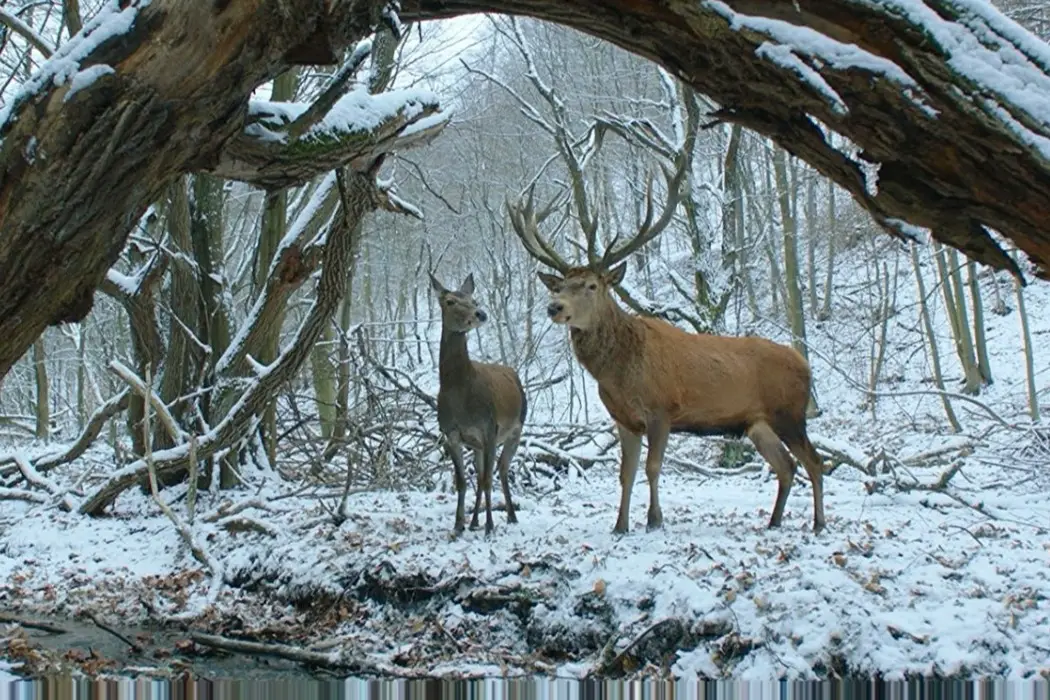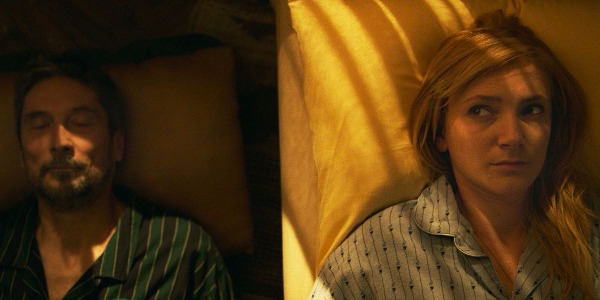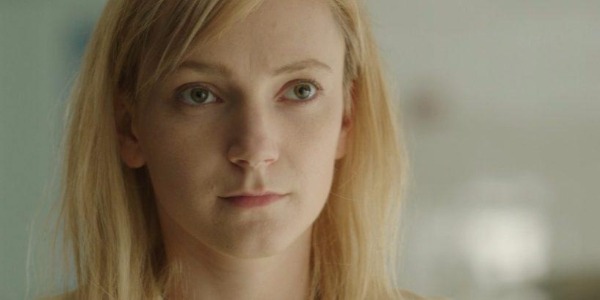ON BODY AND SOUL: A Most Peculiar Love Story

Alex is a film addict, TV aficionado, and book lover.…
Hungary picked up an Oscar nomination for Foreign Language Film this year, which was hardly a surprise given that their pick, On Body and Soul, took home the Golden Bear at Berlin. The country’s selection committee would’ve made an egregious mistake not submitting it, but I’m guessing there was still some hesitation. The film is deeply weird, and even as you walk away enchanted by it, you’ll probably also be scratching your head.
Still, the movie didn’t come completely out of nowhere. Writer/director Ildikó Enyedi burst onto the scene over twenty five years ago with My Twentieth Century, a film that won her the Camera D’Or (Golden Camera) at Cannes, but projects from her have been sporadic ever since. On Body and Soul is actually her first feature since 1999, which is plenty of time for her reputation to be forgotten. Perhaps the triumphant reminder of her skill is why On Body and Soul has been so lovingly embraced, but even without that backstory, the film is a straight-up treat for anyone tired of the same old, same old.
The film wastes little time getting you off balance. The opening sequence is of two deer in a wintery forest, a mildly eerie setup for film nerds raised on Bambi. But instead of anything traumatic, the pair just nuzzle, and it’s not until much later that the audience learns they were dropped into a dream. Two slaughterhouse workers share this nighttime idyll, and the film is about them trying to make the same intimate connection in their waking life. It’s both methodical and languid, on the nose and impenetrable- but mostly, it’s just a joy to experience.
Juggling Tone
In case the deer-filled dream sequence and the slaughterhouse setting didn’t tip you off, it should be clearly stated that On Body and Soul never settles into any one type of film. Yes, it’s primarily a romance, but it’s a romance by way of a fairy tale, a mental illness drama, a dark comedy, and so much more.

These shifts are what keep you engaged throughout its nearly two hour runtime, as Enyedi and her team manage the transitions impeccably. One minute you’ll be seeing the sterile processing of cattle (of which there is some graphic footage) and the next you’ll be thrown into the minutia of people inching their way closer to one another. This makes what is otherwise a meandering narrative seem light on its feet even while a solid through-line is maintained with the sound design and framing.
And yes, credit must also go to the two extraordinary leads. Neither are overly experienced (it’s Géza Morcsányi’s first film while Alexandra Borbély is primarily a theater actress), but each navigate their cordoned off and reserved characters rather naturally. Borbély is the one who immediately stands out, as you come to find out her Mária has some sort of mental disorder (most likely autism). This means Borbély must work with restricted expressions, but don’t worry, the character is much more than her disorder. She and Morcsányi give the two lovers complexity without pushing for too much, always allowing Enyedi to shift the tone around their affecting performances.
A Study In Contrast
Even when the film feels stuffed with strange tangents, there’s a sense that it’s all revolving around some central premise. This is a movie filled with opposites, from the woods and the slaughterhouse to mental disorders and physical ailments (Morcsányi’s Endre has a bad arm). At first, these diametric elements feel out of place. It’s a film about connection, after all, so highlighting contrasts seems counterintuitive.

Eventually, though, it becomes clear that these are things that push Mária and Endre together. The nice twist of this film is that the two aren’t natural fits. Both are too reserved, too unsure of themselves to keep their connection going. The relationship starts and stops, but they always end up back together. It’s as if neither fit into the world around them, but their dreams are helping them envision a place where they both belong.
It’s a sweet way of showing the intense togetherness of being in a relationship, an us versus the world mentality where the world also helps you out a bit. Perhaps that’s what gives the film its gentleness despite having some crass elements. It’s ultimately a hopeful parable about finding a person to love, even in places where you least expect them.
Imperfect Hypnotism
On Body and Soul does come together nicely upon reflection, but watching the film for the first time definitely qualifies as an experience. You’d be forgiven if you had OMC’s ‘How Bizarre’ stuck in your head by the end, not because the song is used in the film, but because your primary reaction will likely be ‘how bizarre.’

Even if you see the film’s ending coming from a mile away, you can’t predict every twist and turn the story takes. If you think I’ve given away lots of strange things in this review, rest assured that you don’t know the half of it. The things that pop up are delightfully odd, and the sense of spontaneity that arises is quite energizing. Let’s face it, most movies follow very familiar patterns, which On Body and Soul mostly disregards.
I’m sure that will turn some people off, and there are admittedly some bits I can’t entirely explain. But perfection is overrated, especially when the bumps form something this thoroughly magnetic. If you fall for this film, it won’t let you down. Enyedi has filled the movie with little details to ponder, and its eccentricities only make you care for the main couple even more.
On Body and Soul: Conclusion
On Body and Soul isn’t a film concerned with forming a neat package. It will wrest you from cinema complacency, challenge you to stay with it, and reward you with an affecting journey. Ildikó Enyedi has made a film worthy of its widespread praise, and she did it with an assured, distinctive hand. It may not be for everyone, but for the adventurous viewer, it’s a must-see.
What did you think of On Body and Soul? Do you like when films take these kinds of risks?
On Body and Soul is available in the U.S. on Netflix and has been released theatrically worldwide.
Does content like this matter to you?
Become a Member and support film journalism. Unlock access to all of Film Inquiry`s great articles. Join a community of like-minded readers who are passionate about cinema - get access to our private members Network, give back to independent filmmakers, and more.
Alex is a film addict, TV aficionado, and book lover. He's perfecting his cat dad energy.













